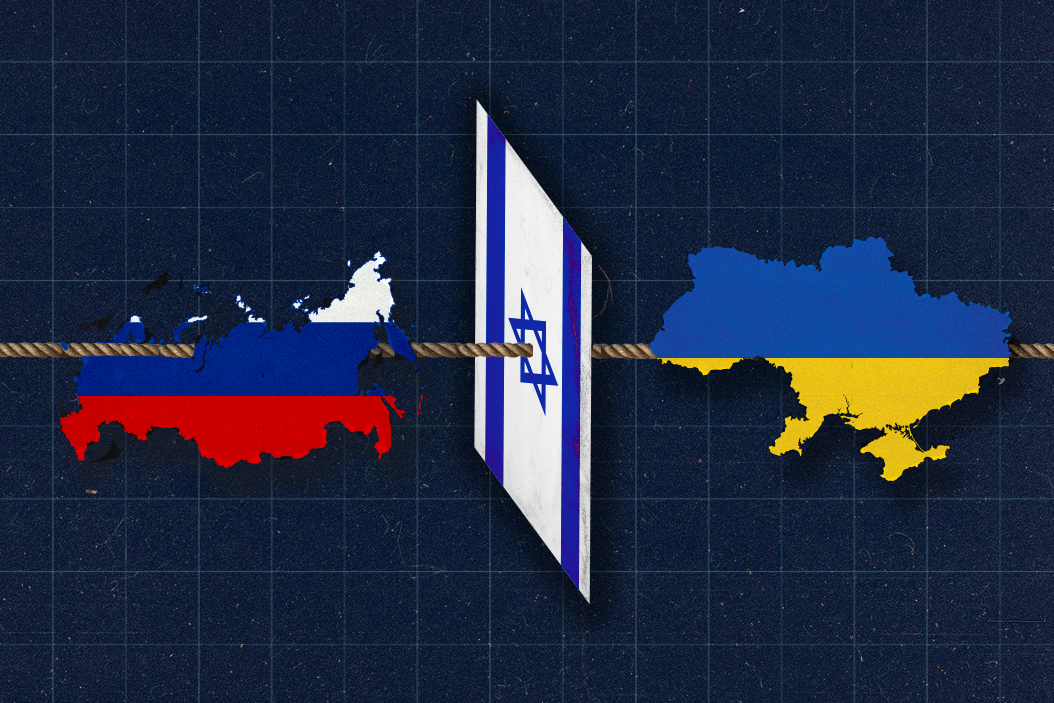Israel, the only country with close ties to Russia and Ukraine, is trying to delicately balance relations with both states. But as things continue to heat up on the Ukraine-Russia front, that's becoming much harder for Israel to do.
In a rare move Thursday, Kyiv summoned Israel's ambassador to Ukraine for a telling off, demanding an explanation following reports that Israel had reached out to Russia for help coordinating the evacuation of its nationals should Moscow escalate.
Why does Israel appear to be playing both sides, and how might things turn out if Russia invades?
A marriage of convenience. Israel and Russia have enjoyed constructive ties in recent decades. But a particular closeness was cultivated by Prime Minister Benjamin Netanyahu and Russian President Vladimir Putin in recent years as Moscow took a dominant role in Syria’s civil war along Israel’s northern border. Netanyahu visited Moscow 15 times from 2011-2020.
For Israel, mitigating threats in the Syrian arena, where its arch foe Iran also yields great influence, is a national security priority. In recent years, Russia — which largely controls Syrian airspace — has allowed Israeli warplanes to target Iranian strategic assets there, including convoys trying to deliver weapons to Hezbollah in neighboring Lebanon. Russia is willing to cooperate with Israel on these aerial missions in part because it is competing with Tehran for dominance inside Syria. But the Kremlin could clamp down if Israel provokes it.
Tel Aviv-based Middle East analyst Danny Citrinowicz told GZERO that Israel is not publicly supporting Ukraine because it knows it has “a lot to lose with Russia in Syria.” For both Israel and Russia, it’s a delicate balancing act in Syria, he says. “If Israel intensifies its attacks [in Syria], that could shake the stability of the Assad regime” and undermine Russia’s strategic interests in Syria and the region. Russia would not look at that kindly, just as it might punish Israel with more limited access to launch strikes against Syria if Jerusalem sided with Ukraine.
Kyiv wants a stronger commitment. Israel and Ukraine, meanwhile, are buddies that share robust trade ties, which they hope to expand with a new free trade agreement. The two countries are also closely aligned diplomatically and culturally, a bond reinforced by the fact that thousands of Ukrainian Jews emigrated to Israel.
But Ukraine wants more. For years, it has been trying to buy Israeli weapons and defense technology to boost its military might. Israel has mostly balked at the requests to avoid stepping over a red line for the Kremlin. Just this week, for example, there were reports that Israel had blocked the sale of sophisticated Iron Dome missile defense systems to Ukraine.
What’s more, because of Israel’s unique status as a “mutual friend,” Kyiv has called on Jerusalem to act as mediator in its deepening row with Moscow. But Naftali Bennett, Israel’s prime minister, is having none of it. In fact, Bennett has reportedly told ministers to “keep a low profile” and to avoid showing deference to either side. Still, Israel has called on its nationals to return to Israel and is planning to evacuate Ukrainian Jews, which suggests it anticipates some sort of Russian offensive.
The Washington equation. Israel and the US are closely aligned on global security issues, yet sometimes their immediate interests diverge. Ukraine is a case in point.
Despite saying that it won’t send US troops to defend Ukraine, the Biden administration has been working overtime to strengthen NATO and ensure a coordinated Western response if Russia escalates. For now, the US appears to be okay with Israel’s fence-sitting, but that could change if Washington wants to inflict more severe pain on Russia in the weeks ahead.
Aaron David Miller, a senior fellow and Middle East policy expert at the Carnegie Endowment for International Peace, says it’s “unlikely” that Israel will be dragged into the conflict. But if the US “pressured Israel to choose sides in the wake of a major Russian move into Ukraine, Israel would likely comply, especially if Biden asked Bennett personally,” he says.
“Moscow is important in Israel's Syria strategy; Washington is critical to its overall strategic advantage.”
